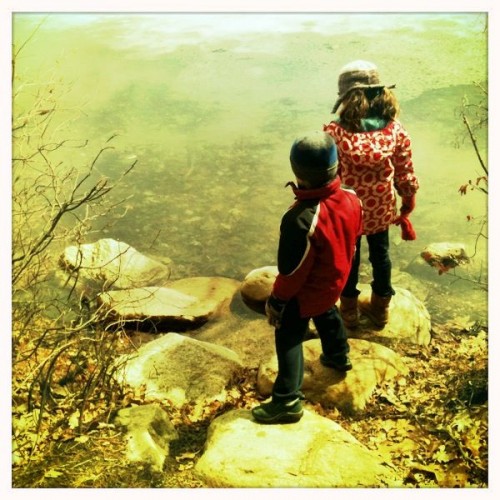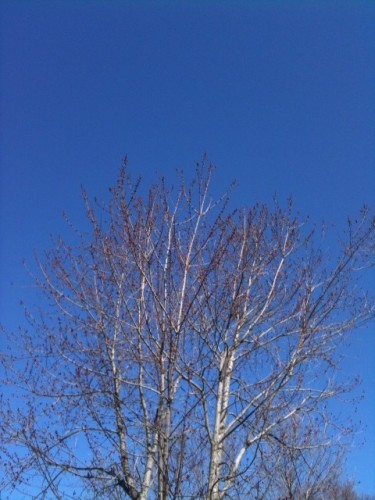
Saturday morning dawned clear and cold. I took Grace and Whit out to breakfast at our favorite diner while Matt slept in. Later, we went to meet some friends to walk around the reservoir in our town. Our friends have a five year old son and an 18 month old daughter. Slowly, we circled the reservoir. The big kids on bikes and so were our friends, with their toddler in a bike seat. Matt and I walked. The children biked out ahead of us, that raveling red string unfurling towards the horizon, stretching, as it does, but never breaking. It was windy and we all walked hunched over, hands jammed into pockets. I looked up, almost desperately, at the branches against the crystal clear sky, looking for buds.
Eventually my friend’s daughter, C, got cold in the bike seat so we took her out to walk. As she wandered along the path, crouching to investigate every small dried leaf or blade of new grass, we joked about how toddlers are the ultimate in people who Stop and Smell the Flowers. Everybody else got cold, waiting for C to amble along, so I picked her up, surprised by how light she was in my arms, and held her against my hip as I walked, talking to my friend, who walked her bike beside me.
Suddenly I noticed Grace biking urgently back towards me, and when she got close I saw that her cheeks were wet with tears. “What, Gracie?” I asked, wondering if she’d fallen. She was crying so hard it was hard for her to get the words out, and she gestured me over so we could speak privately. I leaned down so that I could hear her, my forehead clunking into the chilly plastic of her helmet.
“Mummy,” she wiped ineffectually at her tears with her mitten, “I want to be your little girl.”
“Oh, Grace!” Instinctively I knelt, still cradling C against my side, and wrapped my other arm around Grace. I hugged her and then pulled back, looking right into her eyes. “Grace. You will always be my little girl.”
“But I’m not as little as she is,” Grace nodded towards C, who was watching all of this with interest.
“I know, Grace. But it doesn’t matter how big you get. You will always be my little girl. You will always be my first baby.”
Appeased, she biked away, and I stood up and resumed walking, but now it was my cheeks that were wet.
Where does this come from? Whit, too, has broken down, sharing through sobs how own sadness at time’s passage. Do they pick this up from my talking about it? The thing is, I don’t actually do that in front of them. More likely, I suspect, sensitivity about time throbs in their bloodstreams as surely as it does in mine. I feel so ambivalent about this; what a weight they carry, and it’s all because of me. I don’t think very much about whether I’d rather be wired differently, because I know I can’t change my leaning toward melancholy or my skinlessness, can’t escape my sometimes-exquisitely painful awareness of life’s beauty and loss. But I don’t like reminders like this one from Grace, of the high costs of having a mother who is more shadow than sun, whose gaze is often through tears, who loves and hurts in equal, fierce measure.
Oh, I worry about them. I want what all parents want, in unison, and with the force of a tide: I want them to be happy. I want joy and ease and as much wonder as they can bear. And then maybe more. I hope the sheer basic fact of my being their mother has not precluded this already for them.

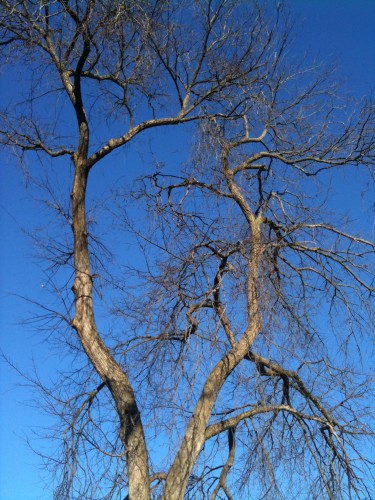
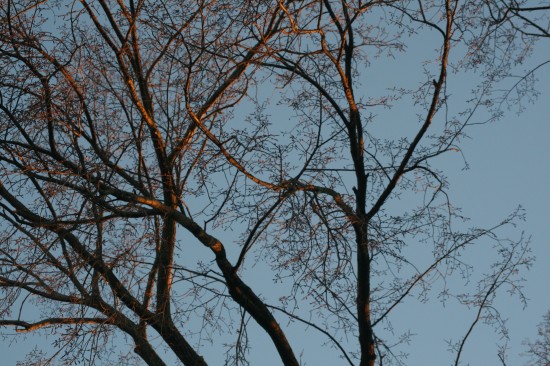 The seasons turn, the light changes, the branches swell with life and then burst into flower and then drop their leaves again. Just like I like
The seasons turn, the light changes, the branches swell with life and then burst into flower and then drop their leaves again. Just like I like 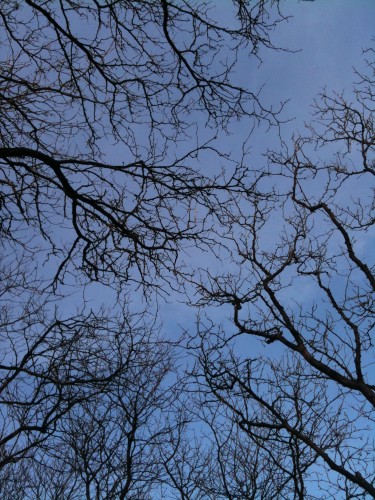
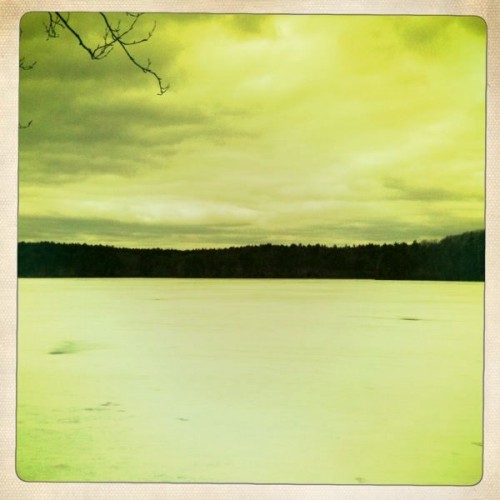 Grace, Whit and I went to Walden today. Over the years I have been there often, pulled by something beyond me, and I always go in the winter. I like it empty and quiet. I like to be the only person (people) there. I like it when I can feel the spirituality crackling in the air. I could today.
Grace, Whit and I went to Walden today. Over the years I have been there often, pulled by something beyond me, and I always go in the winter. I like it empty and quiet. I like to be the only person (people) there. I like it when I can feel the spirituality crackling in the air. I could today.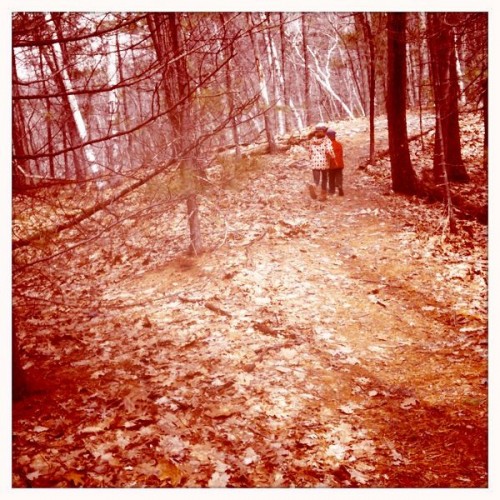 As we walked I told Grace and Whit about Thoreau, about how he chose to live simply, to focus on the natural world around him. Our adventure quickly turned into a
As we walked I told Grace and Whit about Thoreau, about how he chose to live simply, to focus on the natural world around him. Our adventure quickly turned into a 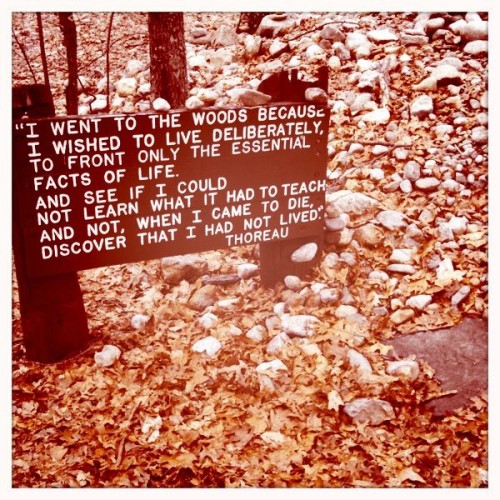 As Grace read the lines, so familiar to me, and I felt my chest tighten. They both had questions about the last line. We talked about what meant to live a life so full that you felt sure, at the end of it, that you’d truly lived. I had sunglasses on so neither child could see that my eyes brimmed with tears. Then they busied themselves building a cairn in the rock pile, as others had done before.
As Grace read the lines, so familiar to me, and I felt my chest tighten. They both had questions about the last line. We talked about what meant to live a life so full that you felt sure, at the end of it, that you’d truly lived. I had sunglasses on so neither child could see that my eyes brimmed with tears. Then they busied themselves building a cairn in the rock pile, as others had done before.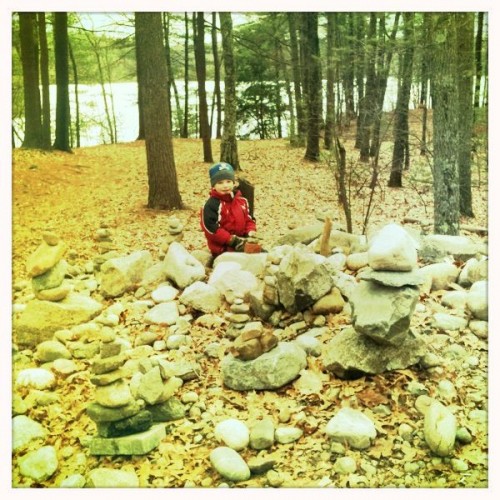 Whit was very curious about the cairns and he moved carefully among the stones, examining the various piles. I imagined what those who erected these monuments were commemorating: the example of a life thoroughly-lived, the commitment to art, the desire to immerse oneself in nature.
Whit was very curious about the cairns and he moved carefully among the stones, examining the various piles. I imagined what those who erected these monuments were commemorating: the example of a life thoroughly-lived, the commitment to art, the desire to immerse oneself in nature.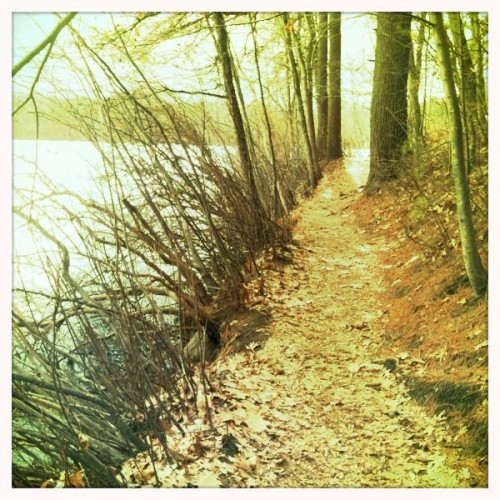 And then we were off again. The trail wound its way around the pond, a multi-season combination of dead leaves and tenacious patches of snow and ice. We walked in companionable silence, Whit’s hand in mine. He announced, apropos of nothing, that when he went to college he still wanted to live at home. “Why?” Grace piped up from ahead of us. Whit didn’t answer right away, just squeezed my hand. “I want to live at college for sure,” she averred confidently as she danced, occasionally skidding in her tractionless Uggs, along the path.
And then we were off again. The trail wound its way around the pond, a multi-season combination of dead leaves and tenacious patches of snow and ice. We walked in companionable silence, Whit’s hand in mine. He announced, apropos of nothing, that when he went to college he still wanted to live at home. “Why?” Grace piped up from ahead of us. Whit didn’t answer right away, just squeezed my hand. “I want to live at college for sure,” she averred confidently as she danced, occasionally skidding in her tractionless Uggs, along the path.